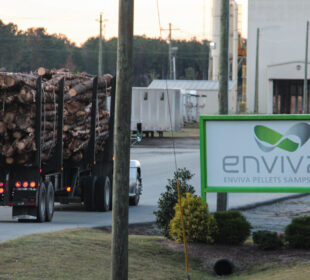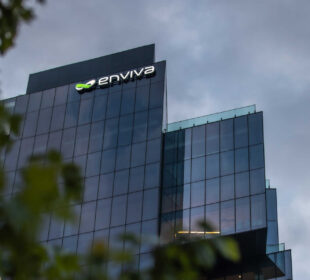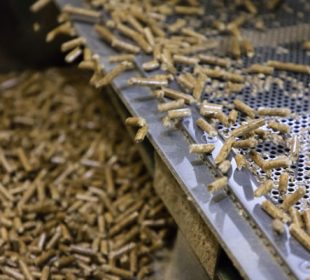Despite challenging market conditions in the broader energy sector, Enviva LP completed 2015 with continued strong operating performance, said Chairman and CEO John Keppler during the company’s Q4 2015 and year-end financial earnings call.
For Q4 2015, Enviva reported net revenue of $116.8 million, a $37.8 million, or 48 percent, increase over Q4 2015, and Keppler said that Enviva expects to distribute at least $2.10 per unit for 2016, a 27 percent increase over the annualized minimum quarterly distribution announced at our IPO less than a year ago.
Keppler emphasized one of the year’s highlights was the “Southampton dropdown,” Enviva’s acquisition of a 510,000-ton-per-year pellet plant located in Southampton County, Virginia. The facility was developed by its sponsor, Enviva Holdings LP, under a joint venture with affiliates of John Hancock Life Insurance Co., and includes a 10-year take-or-pay off-take contract (385,000 metric tons in the first year), and a matching 10-year shipping contract.
After the financial portion of the call, Keppler went on to discuss current and potential market opportunities.
In Europe, Enviva’s core market, many countries are still behind major renewable energy requirements, Keppler pointed out. “The U.K. is still our largest and currently projected consumer of industrial wood pellets, and there have been several positive developments from a policy standpoint, as well as progress at the individual plant level.”
On the policy front, the U.K. Department of Energy and Climate Change recently announced plans to close all coal fired plants by 2025, Keppler noted. “As such, renewable energy will play a larger role in U.K. power supply.”
He added that policymakers are beginning to compare renewable energy options on a total-cost basis, appropriately including the cost of backup generation and intermittent power sources. He quoted the head of DECC and U.K. energy secretary, who recently said, “In the same way generators should pay for the cost of pollution, we want intermittent generators to be responsible for the pressures they add to the system when the wind does not blow or the sun does not shine.”
With the success power generators have already achieved converting coal-fired plants 100 percent biomass, and its cost-effectiveness compared to other renewables, Keppler said that Enviva expects biomass and demand for wood pellets to continue to grow significantly. “Not mention additional demand expected due to the enhanced renewable heat incentive the U.K. government announced as well,” he said.
At the plant level in the U.K, there have been some recent key developments, according to Keppler, one being the European Commission’s approval of state aid for the 420-MW Lynemouth coal-to-biomass conversion, and its sale from RWE to EP UK Investments Ltd., which intends to convert to wood pellet fuel by the end of 2017 and is estimated to require about 1.5 million tons annually.
The second development was Drax’s third 660-MW unit entering the next stage of the EU state aid approval process. It is expected to create demand for an additional 2 million tons of wood pellets annually, Keppler said.
Moving on, Keppler pointed to MGT Power’s 299-MW Teesside Renewable Energy Plant, which is expected to commence construction during the second quarter of this year. Enviva Wilmington Holdings LLC, Enviva’s sponsor’s joint venture with affiliates of John Hancock Life Insurance Company, has executed a new take-or-pay contract to be the sole source supplier for imported biomass fuel, with nearly 1 million tons needed annually. Deliveries under the contract are expected to commence in 2019, Keppler said.
He also addressed German Pellets GmBH’s relationship to the Langerlo power facility conversion in Belgium. E.ON completed the sale of the 556-MW plant to a German Pellets affiliate last year, and Enviva secured an off-take contract to supply wood pellets to the plant beginning in 2017. Keppler said that though German Pellets has filed for insolvency, the filing doesn’t involve the current owner of the facility. However, given the financial distress of the affiliated entity, Enviva is closely monitoring the situation, he said. “We believe a system-relevant plant like Langerlo will ultimately get converted, whether by this owner or industry party. We expect to get our share of the fuel supply regardless of who does the conversion. “
Keppler said there isn’t a direct link between German Pellets and its affiliate in terms of capitalization and financial structures, and that there is no common legal structure. “But these things can bleed over, and we will make sure our interests are protected,” he said, adding that it’s an important plant to the Belgium power supply.
Keppler also discussed opportunity in the Dutch market, which is considering phasing out coal generation, potentially leading to a significant demand in biomass, and pointed to substantial wood pellet demand growth in Asia. He also noted that though while not a part of Enviva’s base assumptions of global market growth, the U.S. EPA’s Clean Power Plan remains a potential upside to market growth, and the company continues to work at the invitation of the EPA on the role of biomass in the plan.
[gravityform id="1" title="true" description="true"]
[gravityform id="2" title="true" description="true"]












